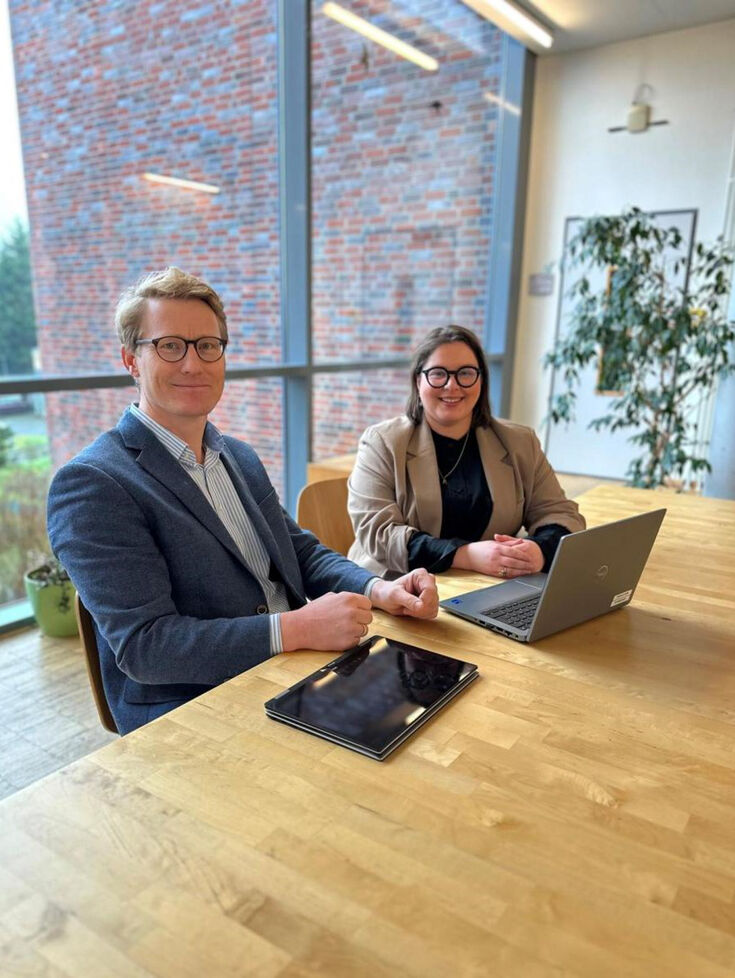Animal welfare, quality and sustainability, transparency regarding origin and processing: Consumers' demands on food have increased. They are increasingly alarmed by safety incidents in particular.
The Hochschule Niederrhein (HSNR) is looking specifically at the meat processing industry in a funded project and wants to know: How can potential food safety and quality problems be identified and remedied in the supply chain before they occur? How can sustainable and resource-saving operations be achieved as a result? And how can animal welfare and health be specifically improved on the basis of collected data?
The Faculty of Food and Nutrition Sciences is conducting research on this until August 2025. HSNR project manager Professor Dr.-Ing. Maik Schürmeyer and project coordinator Corinna Köters are working with Offenburg University of Applied Sciences and the Fraunhofer Institute for Applied Information Technology (FIT) to develop applications in the field of artificial intelligence (AI), which will be tested in the production facilities of the two regional project partners Kolsert KG and Sauels frische Wurst GmbH Fleischwaren & Co. KG. For its joint project "Artificial Intelligence for Sustainable Food Quality in Supply Chains (KINLI)", HSNR is receiving 238,000 euros from the German Federal Ministry of Food and Agriculture.
The goal: a technical system that uses AI to register emerging deviations early on in the processing chain. This is important for removing conspicuous batches or stopping the process. With many systems used in industry, abnormalities are often only detected in the end product after the raw material has already gone through all the processing steps. "We want to act faster, especially proactively," says food scientist Corinna Köters, who sees a major advantage in the predictive approach.
But what exactly happens at KINLI? The food safety and quality aspect is being tested using the example of cooked ham production. Using AI, recorded production and process data is analyzed to identify critical points in the process at an early stage and mark them for quality management. Do the unprocessed meat and the measured values of the processing procedures correspond to the specifications? Using image data and other technical aids, this can be easily identified by the AI.
However, the system goes one step further back and starts at the rearing stage. To this end, the AI evaluates image data from turkeys in order to draw conclusions about the rearing and husbandry conditions of the farm animals. In this way, abnormalities in movement patterns or health status can be identified and measures to increase animal welfare can be derived.
Although the concept is initially focused on the meat industry, it is intended to be designed in such a way that it can be easily transferred to other sectors of the food industry. In this project, Offenburg University of Applied Sciences and FIT are in charge of developing the AI, while HSNR is responsible for the conceptual work. It is the interface to the practical partners, creates a concept for AI in the meat industry including market analysis, examines use cases in the participating companies and manages the project over the entire period.
Students are also involved by writing semester theses as well as theses in the Nutritional and Food Sciences (B.Sc.) Bachelor and Master degree programmes.
Fact Box:
- Funding project surname: KINLI(Artificial Intelligence for Sustainable Food Quality in Supply Chains).
- Duration: Until August 31, 2025
- Funding amount: Around 1.66 million euros from the German Federal Ministry of Food and Agriculture, of which 238,000 euros will go to HSNR. In total, there are 44 million euros for 36 collaborative projects nationwide on the topics of agriculture, food chain/healthy nutrition and rural areas. KINLI is one of a total of five projects in the area of food chain and health nutrition.


















